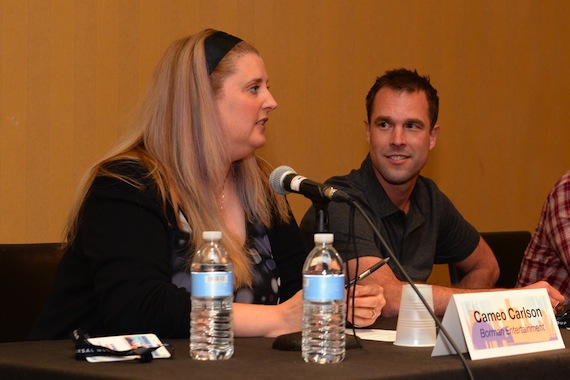

Pictured (L-R): Cameo Carlson and James Blades. Photo: Music Biz.
Music Biz 2016 launched Monday, May 16, in Nashville with a solid lineup of speakers from the segments of publishing, artist management, touring, and more.
During a panel titled Artist Management Now: Today’s New Structures and Services, Borman Entertainment’s Cameo Carlson, Blades Entertainment’s James Blades, Mtheory’s Zack Gershen and Marbaloo Marketing’s Faithe Parker discussed the current state of artist management.
Like most sectors of the music industry, artist management is in a state of rapid change.
Carlson, the moderator for the panel, called artist managers “the global head of artist development,” emphasizing the manager’s central role to an artist’s overall career progression. Panelists agreed with the need for a constant overseer in an artist’s career, with “heavy emphasis on touring.”
According to the panelists, 75-80 percent of an artist’s income is now drawn from touring activities.

Pcitured (L-R): Zach Gershen and Faithe Parker. Photo: MusicBiz
“Labels have historically been good at financing, radio promotion and distribution,” said Gershen, “but in today’s business, that’s not always enough. There are more options now for financing and distribution. They are still the best in the business at radio promotion, though we took [Major Lazer’s] ‘Lean On’ to No. 1 with no major label. It all goes back artist marketing.”
That is where third-party services complement the central role of managers, integrating and filling the gaps between the artist’s career needs and the services that managers can provide.
Carlson summed up the changes, saying, “”Every job I’ve had in the past 15 years, the job didn’t exist before I came on. As other parts of the industry shrink, they can’t offer certain services, and the managers have to add services and yet they keep the same commission. No one person can do everything, or can be an expert in everything. This is why you can have [third-party] companies come in.”
“You have to decide what areas you are an expert in, and bring talented people alongside you to fill those gaps,” said Parker.
The changing role of managers’ services also changes the discussion of payment.
“There are discussions of social media, regarding when does management pay for it and when does the artist pay for it?” Carlson said. “For example, [Borman Entertainment client] Keith Urban has an employee who does social media, and more. They are in our office, but they are a Keith employee, and not a Borman employee. But not every artist can afford to do that.”

Category: Featured
About the Author
Jessica Nicholson serves as the Managing Editor for MusicRow magazine. Her previous music journalism experience includes work with Country Weekly magazine and Contemporary Christian Music (CCM) magazine. She holds a BBA degree in Music Business and Marketing from Belmont University. She welcomes your feedback at jnicholson@musicrow.com.View Author Profile


